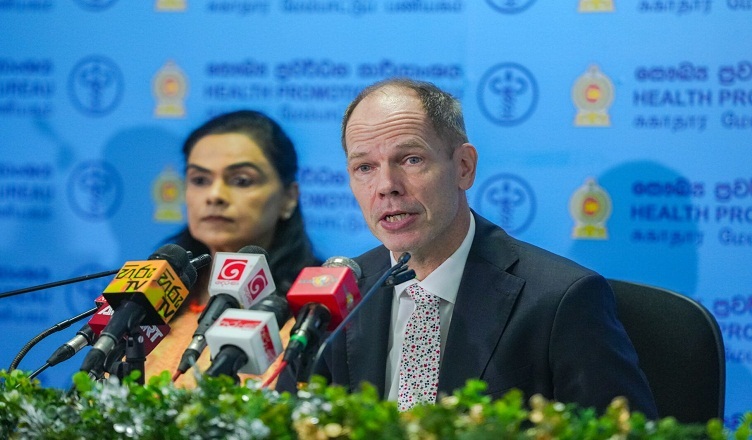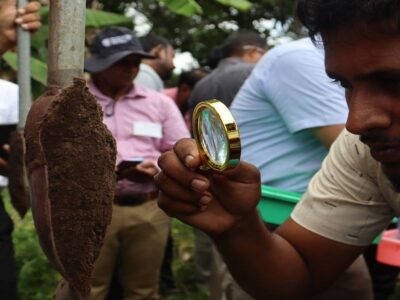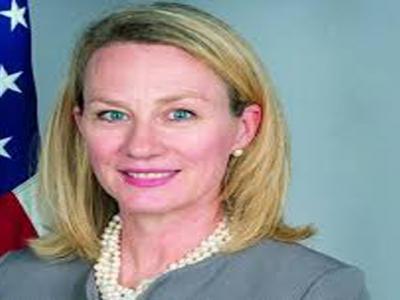(LANKAPUVATH | COLOMBO) – UNICEF, together with WHO, will support the Ministry of Health in implementing a supplementary measles immunization activity (SIA) in Sri Lanka aimed at controlling the ongoing measles outbreak, midst over 700 measles cases reported in the country since May 2023.
The SIA will be launched in two phases; the first phase will commence on 6 January, targeting 6-9-month-olds in nine identified districts with a high population density where measles cases were reported, including Colombo, Gampaha, Kalutara, Galle, Matara, Kandy, Jaffna, Kurunegala and Kalmunai. The second phase will be initiated on January 20 and extended to other age groups across the country.
Speaking at a press briefing held in Colombo recently to announce the launch of the supplementary immunization activity, UNICEF Representative in Sri Lanka, Christian Skoog said, “UNICEF, as well as WHO, has been closely associated partners with the Ministry of Health for many years in the implementation of the national immunization programme, which is a success story in Sri Lanka. However, even with a high immunization coverage, measles outbreaks can occur among unvaccinated children, especially when there are outbreaks in the region. While the numbers are small with the recent measles outbreak, it is important to take it seriously and that is what the Ministry of Health is doing, in taking appropriate steps to control it.”
He also added the assistance extended by UNICEF during COVID-19 pandemic in 2020-2021 to maintain the quality of vaccines by addressing the gaps in the cold chain equipment system, will undoubtedly support in implementing this effective supplementary immunization activity.
Meanwhile, Secretary to the Ministry of Health (MoH), Dr. Palitha Mahipala expressed confidence in the success of the vaccination drive, stating, “There is no other country in the world which has reached over 99% immunization coverage. I can confidently state without any hesitation that Sri Lanka is the only country which reached a 99.9% immunization coverage. So, I am optimistic that with this supplementary immunization activity, the measles cases reported will be reduced.”
The measles, mumps and rubella (MMR) vaccine was introduced into Sri Lanka’s immunization program in 1984. In 2001, a second dose of the vaccine was introduced to improve population level immunity and in 2019, the WHO declared Sri Lanka as a country free of Measles. However, a significant drop in global immunization coverage from 2020 to 2022 impacted many countries in the region, which has led to a rise in measles cases once again, including in Sri Lanka.
Dr. Alaka Singh, WHO Representative to Sri Lanka who also spoke at the presser said, “The cases reported so far have been mild, and no deaths have been reported. However, measles can be a major childhood disease, which can and must be prevented. Accordingly, MoH has embarked on a rapid supplementary immunization activity in two phases through the strong primary healthcare system. We, as WHO, reiterate our full support for this program and overall recovery in Sri Lanka going forward.”
Other experts in attendance at the media briefing included Dr. Asela Gunawardena, Director General of Health Services, Ministry of Health; Dr. Vinod Kumar Bura, Coordinator, Immunization and Vaccine Development, Department of Communicable diseases, WHO South-East Asia Regional Office; the Chief Epidemiologist; Director, Health Promotion Bureau as well as other consultants and specialists from MoH.
UNICEF and MoH, through this latest SIA are committed to combating any possible measles outbreaks in Sri Lanka. While measles is highly infectious, past vaccination initiatives have shown success in controlling outbreaks when high coverage is achieved. Stakeholders noted that strategic public awareness and community engagement will be critical in conveying the urgency of vaccinations and ensuring the campaign’s success.




